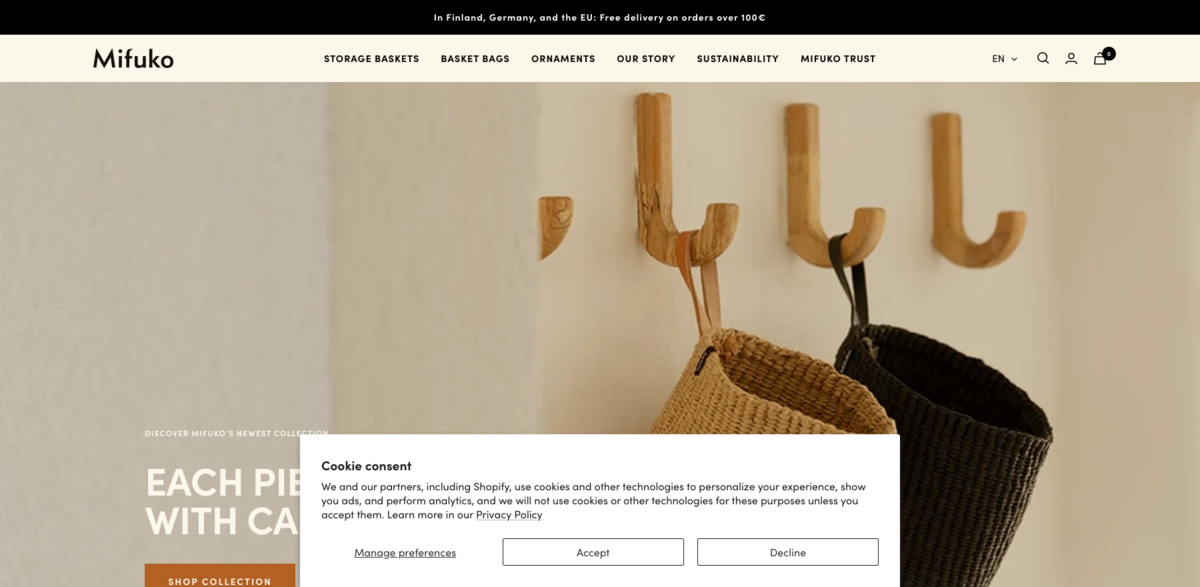What is the Mifuko Project?
Mifuko is a Finnish design company on a heartfelt mission: to bring joy to customers while uplifting the welfare of women in rural Africa. The brand’s baskets, bags, and home décor pieces are handcrafted by over 1,300 women artisans across Kenya, Tanzania, and Ghana. These beautiful creations, blending modern Nordic design with traditional African craftsmanship, reach homes in more than 30 countries worldwide. Fun fact: “mifuko” means pocket in Swahili, and true to its name, Mifuko ensures no one is left with empty pockets.
Main Benefits and Key Facts
Here’s a quick snapshot of what makes Mifuko stand out:
- More than 1,300 women artisans empowered in rural Kenya, Tanzania, and Ghana
- Products sold in over 30 countries, spreading fair trade and sustainable design globally
- Certified member of the World Fair Trade Organisation (WFTO), guaranteeing fair wages and continuous orders
- Each product is unique, handmade, and carries the name of its maker — a personal touch that connects buyer and artisan
- Founded in 2009 by two friends, Mari and Minna, inspired by the vibrant markets of Nairobi
- Supports local entrepreneurship and community building through weekly self-help group meetings
- Non-profit arm, Mifuko Trust, actively improves sanitation and climate change mitigation in rural East Kenya
- Directly impacts approximately 6,500 people, including women, men, and children
- B Corp score of 106.6, reflecting strong commitment to ethical and sustainable business practices
The Art of Basketry and Handcraft
Mifuko baskets are more than just home décor — they’re a testament to traditional basket weaving techniques passed down through generations. This craft provides vital employment in regions where farming is becoming less reliable due to climate change. The artisans weave their stories and culture into every piece, creating products that are both functional and deeply meaningful. Plus, the weekly self-help groups aren’t just about weaving; they’re about community, skill-sharing, and empowerment. It’s a beautiful cycle of tradition and progress.
Fair Trade and Ethical Fashion at the Core
At the heart of Mifuko’s business model is fairness. The company follows an inclusive approach that ensures artisans receive fair payment for their work. This isn’t just about money — it’s about security, dignity, and the ability to plan for the future. Being a certified member of the World Fair Trade Organisation means Mifuko commits to continuous orders and fair wages, providing a stable income for artisans and supporting the well-being of entire communities. Ethical fashion isn’t a trend here; it’s a way of life.
Sustainable Design Meets Scandinavian and African Craftsmanship
Mifuko’s products are a unique fusion of Scandinavian minimalism and vibrant African artistry. This blend creates timeless pieces that fit perfectly into sustainable home décor and fashion. Each item tells a story — of culture, creativity, and conscious design. The company’s vision to double the number of artisans by 2025 shows a commitment to growing this beautiful partnership and promoting sustainability on a larger scale. It’s design with a purpose, and it’s catching eyes worldwide.
Project Impact on Sustainable Development Goals (SDGs)
- SDG 1: No Poverty — empowering low-income women through fair wages and steady work
- SDG 5: Gender Equality — improving the welfare of women and their communities
- SDG 8: Decent Work and Economic Growth — supporting local entrepreneurship and sustainable livelihoods
- SDG 12: Responsible Consumption and Production — promoting sustainable design and ethical fashion
- SDG 13: Climate Action — addressing climate change impacts through community projects
- SDG 17: Partnerships for the Goals — building long-term collaborations with artisans and communities
The Role of Mifuko Trust
To deepen its social impact, Mifuko established Mifuko Trust in 2012 — a non-profit dedicated to improving life in rural East Kenya. The Trust focuses on sanitation projects and climate change mitigation, working closely with over two dozen self-help groups. These groups reach around 1,300 low-income families, which means the Trust positively touches the lives of roughly 6,500 people. It’s a powerful example of how business and charity can join forces to create lasting change.


















